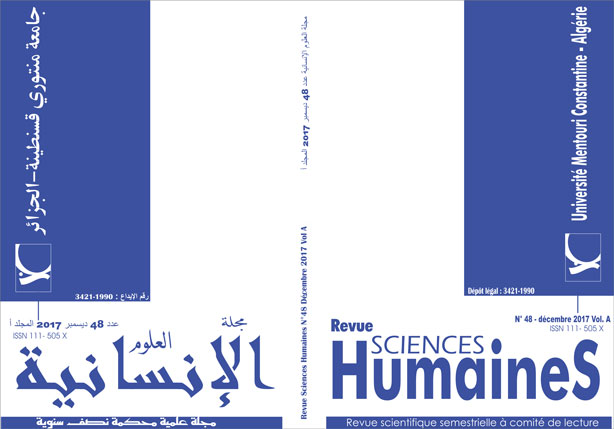Attitudes and Preferences of Self-Repair and Corrective Feedback of Oral Production in Classroom: A Corpus-Based Study The case of Second Year LMD students at the University of “Frères Mentouri” Constantine
الكلمات المفتاحية:
Attitudes، Preferences، Self-Repair، Corrective Feedback، Oral Production، Classroom، Corpus-Based Study، Second Year، LMD، students، University، Frères Mentouri، Constantineالملخص
Oral errors are commonplace in the EFL learning process. The willingness to elicit teachers’ and students’ collaboration in error treatment towards enhancing oral production and uptake is the aim behind this study. Based on the main questions “Who, when, what and how to correct?” and “How much uptake is generated?”, two attitudinal questionnaires were delivered to 150 second year LMD students and 16 teachers in the English department inquiring their perceptions about error repair. We further probed both teachers’ and students’ repair behaviour via a non-participatory natural classroom observation during 16 hours of oral courses varied between interaction and presentations. We detected controversial, though not conflicting, results on two levels of analysis: Students’ Vs Teachers’ attitudes and preferences towards the repair of oral failures, besides the claimed attitudes Vs those revealed during classroom observation which generated average amounts of students’ uptake. These findings lend a strong support for our hypothesis, which speculates that the betterment of students’ spoken language can be achieved through a conscious cooperation between teachers and students regarding each others’ preferences towards error treatment. Those preferences are worthy of further pursuit of research.
التنزيلات
المراجع
- Allwright, R.L. 1975. 'Problems in the Study of the Language Teacher's Treatment of Learner Error'. In Burt, M.K. and Dulay, H.C. (eds.), New Directions in Second Language Learning, Teaching and Bilingual Education. Washington, D.C.: TESOL.
-Barbetta, P.M., Heward, W.L., Bradely, D.M., Miller, A.D. (1994). Effects of Immediate and Delayed Correction on the Acquisition and Maintenance of Sight Words by Students with Developmental Disabilities. Journal of Applied Behavior Analysis. 1994,27, 177-178.
-Chaudron, C. (1986). Teachers’ priorities in correcting learners’ errors in French immersion classes. In R. Day (Ed.), Talking to learn: Conversation in second +language acquisition (pp. 67). Rowley, MA: Newbury House.
-Chomsky, N. (1965). Aspects of the Theory of Syntax. Cambridge, Massachusetts: MIT Press.
-Corder, S.P. (1967). The significance of learner’s errors. International Review of Applied Linguistics in Language Teaching 5(4): 161-170.
-Ellis, R. (2013). The Study of Second Language Acquisition. Second edition. Oxford University Press.
- Faqeih. H.I. (2012). The Effectiveness of Error Correction during Oral Interaction: Experimental Studies with English L2 Learners in The United Kingdom and Saudi Arabia.( Thesis).University of York. Department of Education
- Hall, J.K. (2007). Redressing the Roles of Correction and Repair in Research on Second and Foreign Language Learning. Modern Language Journal. 91(4). 511-26.
- Hendrickson, J. (1978). Error correction in foreign language teaching: Recent theory, research, and practice. Modern Language Journal, 62, 387-398.
- Holley, F.M. and King, J.K. (1971) . 'Imitation and Correction in Foreign Language Learning'. Modern Language Journal 55: 494-498.
- Lee. N. (1990). Notion of error and Appropriate Corrective Treatment. Hongkong Papers in Linguistics and Language Teaching 13(1990). ISSN 1015-2059
- Ludwig, J. (1982). 'Native Speaker Judgements of Second Language Learners' Efforts at Communication: A Review'. Modern Language Journal 62: 249-253.
- Lyster, R. (2001). Negotiation of Form, Recasts, and Explicit Correction in Relation to Error Types and Learners’ Repair in Immersion Classrooms. Mc Gill University. Canada. Language Learning Journal, Vol.51.(.265-301). Wiley-Blackwell, Hoboken, NJ, U.S. Retrieved 25 February, 2011 from: http://www.Refdoc.fr/Detailnotice?cpsidt=1162465& traduire=fr /
- Lyter, R., Ranta, L.(1997). Corrective Feedback and Learner Uptake “Negotiation of Form in Communicative Classrooms”. Cambridge University Press. SSLA 20, 37-66.
- Lyster, R., Saito, K., and Sato, M. (2013). Oral corrective feedback in second language classrooms.Language Teaching,/ Volume 46 / Issue 01 / January 2013, pp 140. From http://journals.cambridge.org/abstract_S0261444812000365
- Mendéz, E.H., Cruz, M.R. (2012). Teachers’ Perceptions about Oral Corrective Feedback and Their Practice in EFL Classrooms. Bogota, Colombia, /Vol. 14, No. 2, October 2012. ISSN 1657-0790 (printed) 2256-5760 (online), pp 63-75
- McDonough, K. (2005). Identifying the Impact of Negative Feedback and Learners’ Responses on ESL Question Development. Cambridge University Press. SSLA, 27, 79–103.
- Pike, Kenneth Lee (ed.)(1967), Language in Relation to a Unified Theory of Structure of Human Behavior (2nd ed.),The Hague, Netherlands: Mouton
- Rahimi, A., Vahid Dastjerdi, H. (2012). Impact of Immediate and Delayed Error Correction on EFL Learners’ Oral Production: CAF. Mediterranean Journal of Social Sciences, Vol. 3 (1) January 2012,ISSN 2039‐2117
- Russell, J., Spada, N. (2006). The effectiveness of corrective feedback for second language acquisition: A meta-analysis of the research. In J. Norris, & L. Ortega(Eds.), Synthesizing research on language learning and teaching (pp. 131–164). Amsterdam: Benjamins.
- Sheen, Y. & R. Ellis (2011). Corrective feedback in language teaching. In E. Hinkel (ed.), Handbook of research in second language teaching and learning, Vol. 2. New York: Routledge, 593–610
- Schegloff, E., Jeffersson, G., and Sacks, H. (1977). The Preference for Self-Repair in Organization of Repair in Conversation. Language. 53(ii), (pp: 361-82). Schegloff Publications Archive. From: http://www.sscnet.ucla.edu/soc/faculty/schegloff/pubs/
- Taipal, P. (2012). Oral Errors, Corrective Feedback and Learner Uptake in an EFL Setting. (Thesis). University of Jyväskylä. From : https://jyx.jyu.fi/dspace/bitstream/handle/123456789/37544/URN_NBN_fi_jyu-201203121409.pdf?sequence=4
- Wang, Z. (2003). A Study on Self-repair Behaviors and EFL Learners’ Oral Fluency. (Thesis). School of Foreign Studies,South China Normal University.
















